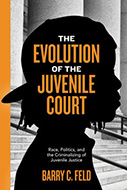The Evolution Of The Juvenile Court: Race, Politics, And The Criminalizing Of Juvenile Justice

Author: Barry C. Feld
Publisher: New York, NY: New York University Press. 2017. 392p.
Reviewer: Chyna N. Crawford | October 2018
The book begins by discussing the curious nature of the juvenile justice system in America. Dr. Feld articulates the beginning of what we know as Juvenile Justice in America. During the Progressive Era in the United States, Americans enacted extensive social reform, and the campaign against child labor ushered in a change in the response to juvenile offenders. Child offenders were treated as adults and imprisoned prior to this reform era. Based upon the actions of political and social reformers, the juvenile justice system began to exercise its authority by invoking a parens patriae (state as parent or guardian) role. The state assumed the responsibility of parenting the children until they began to exhibit positive changes, or became adults. Feld contrasts these relatively positive sweeping progressive changes occurring in the Northern states with the harsh reality of the emergence of Jim Crow in the south. His book clearly contrasts the two opposing sides of the juvenile justice policy debate, and how it went on to shape the 21st century juvenile justice system.
Feld then outlines a second wave of changes in the American juvenile justice system known as the Due Process Era. By this time (the 1960s), juvenile courts had jurisdiction over nearly all cases involving persons under the age of 18. Feld notes that academics and legal scholars questioned the constitutionality of the juvenile court as it then functioned, and argued for the adoption of constitutional protections for juveniles.
In part three, the author discusses the structural changes that occurred in the 20th century and how these changes led to the Get Tough Era. Commercial innovation transformed America from a rural farming society into a society more focused on metropolitan manufacturing. He notes that modernization, migrations, and the steep rise in juvenile crime that occurred between the late 1980s and mid-1990s created a “nexus between race, crime and fear that enabled [the] politics of crime” (pg. 71). Americans confronted mounting fear over well-publicized and violent juvenile crime, and responded by adopting harsher responses to offenses. These included increases in transfers to adult court, public hearings, and record sharing. Essentially, as Feld notes, the adoption of formal trials for juveniles mirrored the public view that many juvenile offenders were not deserving of rehabilitation, but rather were young criminals needing punishment.
Finally, Feld summarizes the most current evolutionary stage of juvenile justice, one he calls the Kids Are Different Era. This era has ushered in changes to some of the ill-advised policies of the 1980s and 1990s. Policymakers and leaders across the political gamut have called for age-appropriate modifications to laws that ignore the dissimilarities between children and adults. Another continuous thread in the author’s discussion is his contention that poverty-stricken juveniles ultimately are left to deal with the collateral consequences of public policies –in the U.S., poverty = criminal. Ultimately, Feld makes clear to the reader that poverty is the root cause of the crime and delinquency problems in America.
The idea of what constitutes juvenile justice in America has changed more than once over the course of time. By titling this book the Evolution of the Juvenile Court, Barry Feld has been able to outline how the U.S. system of justice for those from certain backgrounds has not adequately lived up to its articulated goals. The book examines various issues surrounding juvenile justice and delinquency, and for those who are interested in U.S. policy in these regards would be a key addition to their library.
Chyna N. Crawford, Ph.D., Assistant Professor of Criminal Justice, Department of Social and Behavioral Science, Elizabeth City State University


